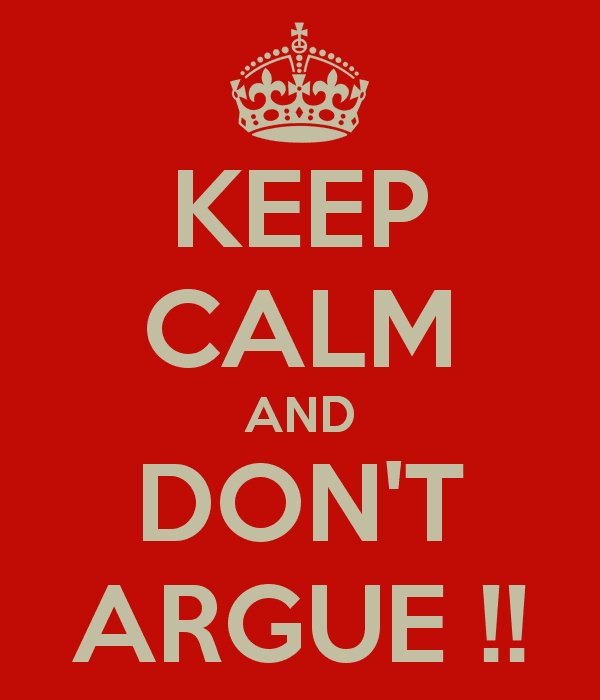You cannot teach a man anything; you can only help him to find it within himself. -Galileo
Most of the time, we try to cajole, persuade, inspire or influence people, so we argue with them to convince them to see things from our perspective. As Benjamin Franklin once said, “A man convinced against his will is of the same opinion.” The key is to understand a basic truth; you cannot win an argument; people change when they are ready to change. The best you can do is to help them make what was unconscious to them become conscious. As Carl Jung once quipped, ‘Until you make the unconscious conscious, it will direct your life, and you will call it fate.’ And as Author John C. Maxwell noted:
- People change when they….Hurt enough they have to
- Learn enough that they want to and
- Receive enough that they are able to
In his classic book, How to win friends and influence people, Author Dale Carnegie writes:
Nine times out of ten, an argument ends with each of the contestants more firmly convinced than ever that he is absolutely right.
You can’t win an argument. You can’t because if you lose it, you lose it; and if you win it, you lose it. Why? Well, suppose you triumph over the other man and shoot his argument full of holes and prove that he is non compos mentis. Then what? You will feel fine. But what about him? You have made him feel inferior. You have hurt his pride. He will resent your triumph. And –
A man convinced against his will
Is of the same opinion still.
As wise old Ben Franklin used to say:
If you argue and rankle and contradict, you may achieve a victory sometimes; but it will be an empty victory because you will never get your opponent’s good will.
So figure it out for yourself. Which would you rather have, an academic, theatrical victory or a person’s good will? You can seldom have both.
Be wiser than other people if you can; but do not tell them so. – Lord Chesterfield
In his great book, The Catalyst: How to Change Anyone’s Mind, marketing Professor and Author Jonah Berger writes about what he called reactance: An unpleasant state occurs when people feel their freedom is lost or threatened.
Pushing, telling, or just encouraging people to do something often makes them less likely to do it.
When pushed, people push back. Just like a missile defense system protects against incoming projectiles, people have an innate anti-persuasion system. Radar that kicks in when they sense someone is trying to convince them. To lower this barrier, catalysts encourage people to persuade themselves.
Restriction generates a psychological phenomenon called reactance. An unpleasant state that occurs when people feel their freedom is lost or threatened.
Change is hard
- We persuade and cajole and pressure and push, but even after all that work, often nothing moves. Things change at a glacial pace if they change at all. People like to feel they have control over their choices and actions. That they have the freedom to drive their own behavior.
- When others threaten or restrict that freedom, people get upset. When told they can’t or shouldn’t do something, it interferes with their autonomy. Their ability to see their actions as driven by themselves. So they push back: Who are you to tell me I can’t text while driving or walk my dog on that pristine patch of grass? I can do whatever I want!
While texting while driving might not have even been that attractive originally, threatening to restrict it makes it more desirable.
Berger proposed some solutions to reduce reactance to your ideas and suggestions:
Allow for Agency
- “To avoid reactance and the persuasion radar, then, catalysts allow for agency. They stop trying to persuade and instead get people to persuade themselves.” To reduce reactance, catalysts allow for agency—not by telling people what to do or by being completely hands-off, but by finding the middle ground. By guiding their path.
Four key ways to do that are:
(1) Provide a menu,
- Try to convince people to do something, and they spend a lot of time counterarguing. Thinking about all the various reasons why it’s a bad idea or why something else would be better. Why they don’t want to do what was suggested.”
But give people multiple options, and suddenly things shift.
(2) ask, don’t tell,
Questions encourage listeners to commit to the conclusion. To behave consistently with whatever answer they gave.
- Rather than taking a predetermined plan and pushing it on people, catalysts do the opposite. They start by asking questions. Visiting with stakeholders, getting their perspectives, and engaging them in the planning process.
(3) highlight a gap,
- People strive for internal consistency. They want their attitudes, beliefs, and behaviors to align. Someone who says they care about the environment tries to reduce their carbon footprint. Someone who preaches the virtues of honesty tries not to tell lies.
- Consequently, when attitudes and behaviors conflict, people get uncomfortable. And to reduce this discomfort, or what scientists call cognitive dissonance, people take steps to bring things back in line.
Highlighting such dissonance, and bringing it to the fore, encourages people not only to see the discord but also to work to resolve it.
(4) start with understanding.
- Before people will change, they have to be willing to listen. They have to trust the person they’re communicating with. And until that happens, no amount of persuasion is going to work.
- Seasoned negotiators don’t start with what they want; they start with whom they want to change. Working to gain insight into where that person is coming from. Comprehending and appreciating that person’s situation, feelings, and motives, and showing them that someone else understands.
Starting with understanding diffuses anti-persuasion radar by making sure the other side gets a chance to say their piece.
Dale Carnegie writes in How to Win Friends and Influence People:
In an article in Bits and Pieces, some suggestions are made on how to keep a disagreement from becoming an argument:
- Welcome the disagreement. Remember the slogan, ‘When two partners always agree, one of them is not necessary.’ If there is some point you haven’t thought about, be thankful if it is brought to your attention. Perhaps this disagreement is your opportunity to be corrected before you make a serious mistake.
- Distrust your first instinctive impression. Our first natural reaction in a disagreeable situation is to be defensive. Be careful. Keep calm and watch out for your first reaction. It may be you at your worst, not your best.
- Control your temper. Remember, you can measure the size of a person by what makes him or her angry.
- Listen first. Give your opponents a chance to talk. Let them finish. Do not resist, defend or debate. This only raises barriers. Try to build bridges of understanding. Don’t build higher barriers of misunderstanding.
- Look for areas of agreement. When you have heard your opponents out, dwell first on the points and areas on which you agree.
- Be honest. Look for areas where you can admit error and say so. Apologize for your mistakes. It will help disarm your opponents and reduce defensiveness.
- Promise to think over your opponents’ ideas and study them carefully. And mean it. Your opponents may be right. It is a lot easier at this stage to agree to think about their points than to move rapidly ahead and find yourself in a position where your opponents can say: ‘We tried to tell you, but you wouldn’t listen.’
- Thank your opponents sincerely for their interest. Anyone who takes the time to disagree with you is interested in the same things you are. Think of them as people who really want to help you, and you may turn your opponents into friends.”
- Postpone action to give both sides time to think through the problem. Suggest that a new meeting be held later that day or the next day, when all the facts may be brought to bear. In preparation for this meeting, ask yourself some hard questions:
Could my opponents be right? Partly right? Is there truth or merit in their position or argument? Is my reaction one that will relieve the problem, or will it just relieve any frustration? Will my reaction drive my opponents further away or draw them closer to me? Will my reaction elevate the estimation good people have of me? Will I win or lose? What price will I have to pay if I win? If I am quiet about it, will the disagreement blow over? Is this difficult situation an opportunity for me?
All the Best in your quest to get Better. Don’t Settle: Live with Passion.



1 Comment
Pingback: How to win friends and Influence People by Dale Carnegie. – Lanre Dahunsi